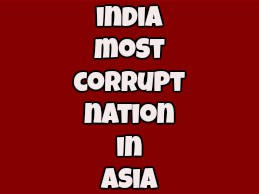

By Sunil Garodia
First publised on 2020-11-26 09:17:24
A majority of the people in India believes that Prime Minister Modi is not corrupt and has been doing much to bring about transparency in public affairs (the electoral bonds being an exception). He has been in office for the more than six years now. Yet, India ranks 80th on the list of 180 countries in the Corruption Perception Index and tops as the most corrupt country in Asia in the Global Corruption Barometer - Asia. Both these reports have been released by Transparency International after an extensive survey where respondents were asked about access to police, courts, public hospitals, procurement of identity documents and utilities. Nearly 40% of the respondents confirmed that they had paid bribes to get their work done. Although this a huge number, those familiar with India will not find it surprising as nothing gets done in most government offices without greasing palms. Another 46% claimed to have used personal connections to get the work done.
What does this signify? It shows that the government is so obsessed with projecting a clean image for itself that it is focusing entirely on big-ticket corruption or where there could be a loss to the exchequer. It has completely forgotten that it this petty corruption at the lowest level that affects the common man more. The common man is concerned if bribes are paid in defence deals resulting in procurement of either products whose price has been grossly inflated or a sub-standard product. But he is more concerned if the babu in a government office asks him to pay bribe for something which he should get as a matter of right. Rampant corruption at lower levels will never erase the perception of the government being corrupt even if the top leadership is perceived to be honest.
To do away with this corruption, the government needs to reform rules and further dismantle the license-quota regime wherever possible. It needs to take care that discretionary and arbitrary powers available to bureaucrats are withdrawn. It needs to ensure that all citizens are treated as equals and some are not allowed to jump the queue because they are wealthy or well-connected. For this to happen, laws need to be crystal clear and transparency needs to be maintained, and monitored, at all levels. Rules have to be simple and free of legal mumbo-jumbo. Also, vigilance departments and anti-corruption units must be freed from political pressures and empowered to play a more proactive role. Whistleblowers must be encouraged protected and rewarded.











